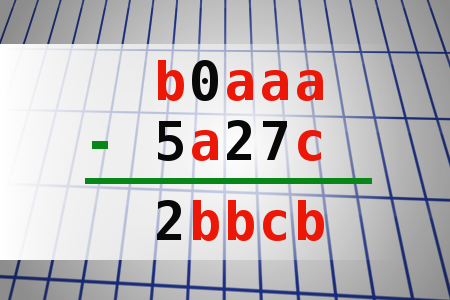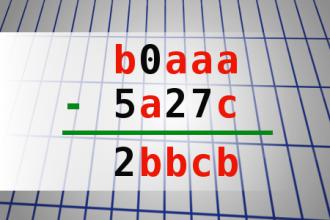Find number abc
If b0aaa - 5a27c = 2bbcb find number abc. Multiple solutions may exist.Correct answers: 4
#brainteasers #math

Four guys were at deer camp...
Four guys were at deer camp. They had to bunk two to a room. No one wanted to room with Daryl because he snored so badly. They decided it wasn’t fair to make one of them stay with him the whole time, so they voted to take turns.
The first guy slept with Daryl and comes to breakfast the next morning with his hair a mess and his eyes all bloodshot. The other two said, "Man, what happened to you?" He said, "Daryl snored so loudly, I just sat up and watched him all night."
The next night it was the second guy’s turn. In the morning, Same thing happens again, his hair is standing up, eyes all bloodshot.
The other two said, "Man, what happened to you? You look awful!"
He said, "Man, that Daryl shakes the roof. I sat up and watched him all night."
The third night was Frank’s turn. Frank was a big burly ex-football player; a man’s man. The next morning he came to breakfast bright eyed and bushy-tailed. "Good morning," he said. The other two couldn’t believe it!
He looked rested and wide awake. They asked, "Man, what happened?"
He said, "Well, we got ready for bed. I went and tucked Daryl into bed, patted his butt and kissed him good night. Daryl sat up and watched me all night."
The first guy slept with Daryl and comes to breakfast the next morning with his hair a mess and his eyes all bloodshot. The other two said, "Man, what happened to you?" He said, "Daryl snored so loudly, I just sat up and watched him all night."
The next night it was the second guy’s turn. In the morning, Same thing happens again, his hair is standing up, eyes all bloodshot.
The other two said, "Man, what happened to you? You look awful!"
He said, "Man, that Daryl shakes the roof. I sat up and watched him all night."
The third night was Frank’s turn. Frank was a big burly ex-football player; a man’s man. The next morning he came to breakfast bright eyed and bushy-tailed. "Good morning," he said. The other two couldn’t believe it!
He looked rested and wide awake. They asked, "Man, what happened?"
He said, "Well, we got ready for bed. I went and tucked Daryl into bed, patted his butt and kissed him good night. Daryl sat up and watched me all night."

